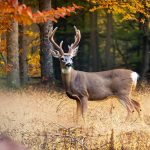Hunting is a popular outdoor recreational activity in Maine that attracts thousands of resident and non-resident hunters every year. It has abundant wildlife and provides excellent opportunities for various game species. This page provides an overview of the key game regulations in the pine tree state.
Important Resources
General Regulations
- All hunters are required to have a valid hunting license for the current year. Licenses can be obtained from authorized agents, online, or from any Maine Department of Inland Fisheries and Wildlife (IFW) office.
- Hunters pursuing big game like deer, moose, and bear must wear fluorescent orange clothing. At least 200 square inches on the head, chest, and back are required during firearms seasons.
- Baiting of any kind for bear is prohibited. Hunters cannot use bait to attract bear.
- It is unlawful to hunt with firearms within 100 yards of a dwelling without permission from the owner.
- The use of dogs is prohibited for bear game, except for tracking wounded bear.
- Certain furbearer species like coyote, fox, bobcat, raccoon, skunk, and opossum is allowed with restrictions on methods and seasons.
- It is forbidden to hunt from a moving vehicle or an airplane.
- Use of artificial lights is restricted. Predator calling devices are allowed.
- Sunday hunting is prohibited except for migratory game birds, coyotes, foxes, bobcats and raccoons.
Deer
- Hunter orange clothing is required during any open firearm season on deer.
- Legal methods for deer include shotgun, muzzleloader, bow and arrow, and crossbow. Specific regulations apply for each method.
- Taking deer at night is prohibited.
- Multiple deer may be taken during bow, crossbow and muzzleloader seasons with appropriate licenses. Limits apply for the regular firearms season.
- All deer harvested must be registered within 18 hours through IFW-designated agents or online.
- Antlerless deer permits are required to harvest does or fawns during some seasons. Availability depends on wildlife management objectives.
Bear
- Bear pursuit is allowed in early fall and mid-spring seasons, with different regulations for each.
- Baiting bears is strictly prohibited at any time.
- Legal firearms for bear include shotgun, muzzleloader, pistol, rifle and bow and arrow. Restrictions apply on caliber, magazine capacity, etc.
- Trail or leashed dogs may be used to track and retrieve wounded bear during the open firearm season.
- No more than 4 bears may be harvested per year, only one of which may be taken during the spring season.
- Hunters are prohibited from shooting radio-collared research bears or bears in their dens.
Moose
- Moose hunting is allowed by permit only during a limited season each fall. Permits are issued through lottery drawings.
- Legal methods are limited to bow and arrow, crossbow, shotgun, and muzzleloader. Specific regulations apply.
- Only bulls, cows, or calves may be taken by permit holders during the moose hunt.
- The permittee has eighteen hours to register the moose at the authorized stations.
- Permittees may keep certain parts from the moose and must surrender the rest to IFW.
- Moose zones are assigned to each permit winner. The permit is only valid for that particular zone.
- The moose hunt is subject to annual review and regulations may change from year to year.
Migratory Game Birds
- Migratory game birds include ducks, geese, woodcock, rails, coots, snipe, and doves.
- In addition to state licenses, federal duck stamps are required for waterfowl species.
- Legal methods vary for different migratory bird species. See rules for shotgun, bow, and falconry regulations.
- Limits are set both per day and per season on migratory game birds. Consult regulations.
- Special restrictions apply to baiting migratory game birds.
- Hunting hours are from 1⁄2 hour before sunrise until sunset.
Legal Hunting Hours
- Legal hours for big game like deer are from 1⁄2 hour before sunrise to 1⁄2 hour after sunset.
- Exceptions are made for coyote, fox, raccoon, and migratory game birds.
- Taking Raccoons at night is allowed during open seasons from sunset to sunrise. Hunters must use a .22 caliber or smaller firearm and be accompanied by a dog.
- Migratory game bird is permitted from 1⁄2 hour before sunrise to sunset.
Baiting Regulations
- Baiting requires landowner permission and proper identification tags on the bait.
- Bait must be removed promptly if requested by landowner.
- Hunting over another person’s bait without permission is prohibited.
- Use of poison or medications as bait is unlawful.
- Deer feeding is prohibited from June 1 to December 15.
- Moose and turkey feeding is prohibited from December 1 to December 15.
- Baiting wild turkeys is prohibited during spring season.
- Artificial lighting over bait sites is not allowed.
- Large game near bait sites is restricted.
North Maine Woods Hunting
- Logging trucks have right of way on roads. Reduce speed to 45 mph.
- Use MURS radios to monitor activities and communicate with loggers.
- ATV use is prohibited. Hunters must access vehicles to retrieve harvested animals.
- Length limits on vehicles. No vehicle or trailer combination over 44 ft.
- Camping allowed away from roads if not disturbing logging activity.
- Do not block roads or impede vehicles.
- Ross Stream bridge closed September 13 to October 1.
Latest posts by John Lewis (see all)
- Virginia Hunting Seasons 2024 Latest Dates & Regulations - July 22, 2024
- Georgia Hunting Season 2024-2025 [Updated Schedule!] - July 19, 2024
- 2024 Tennessee Hunting Seasons New Dates & Regulations! - July 11, 2024


